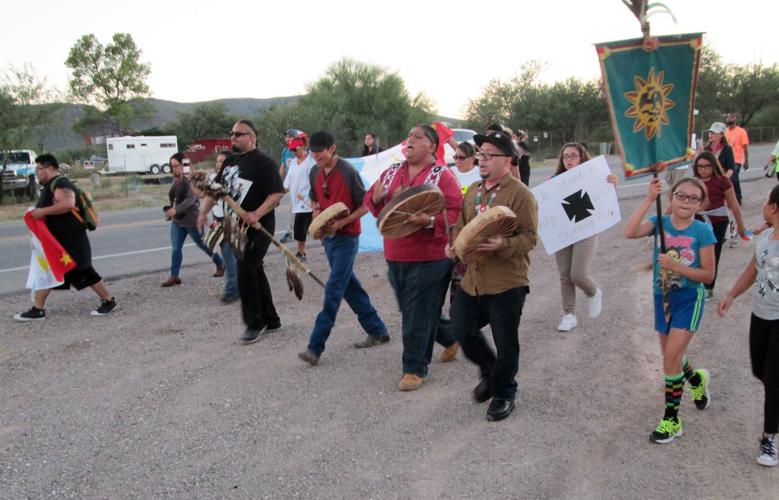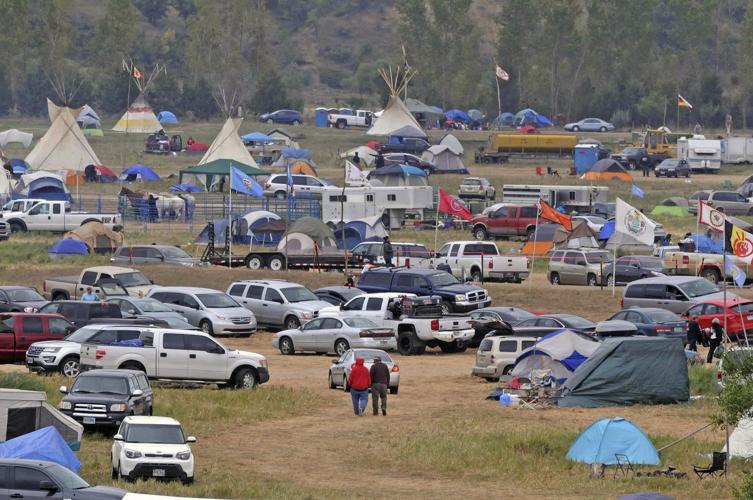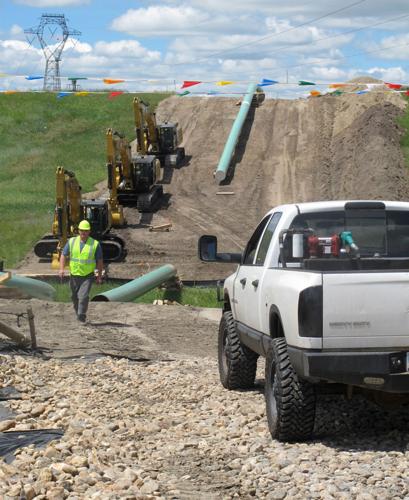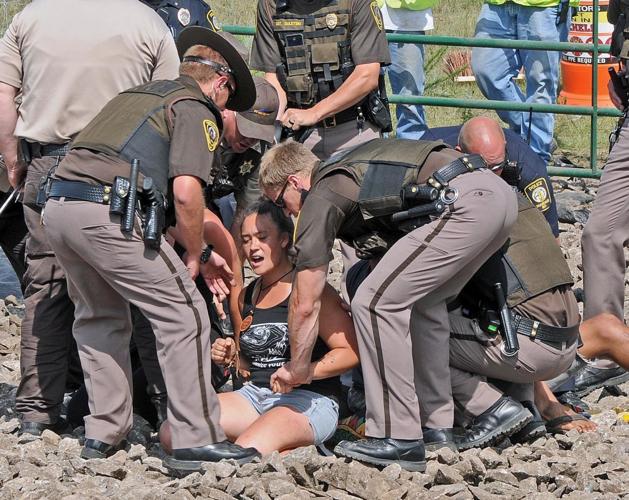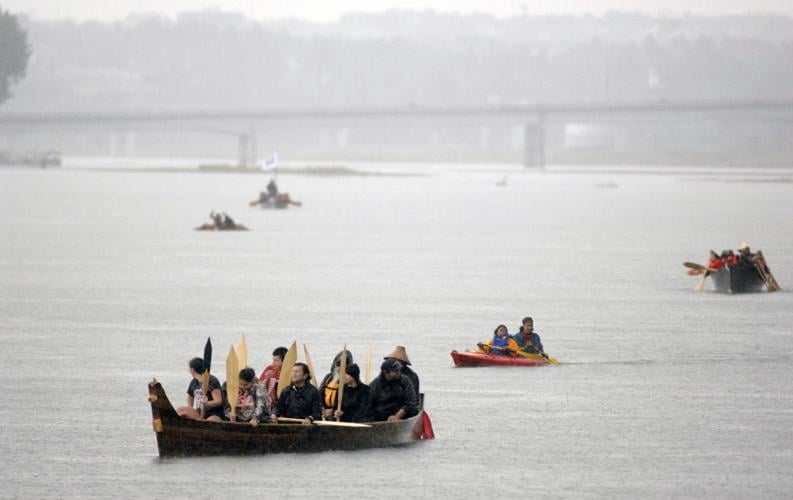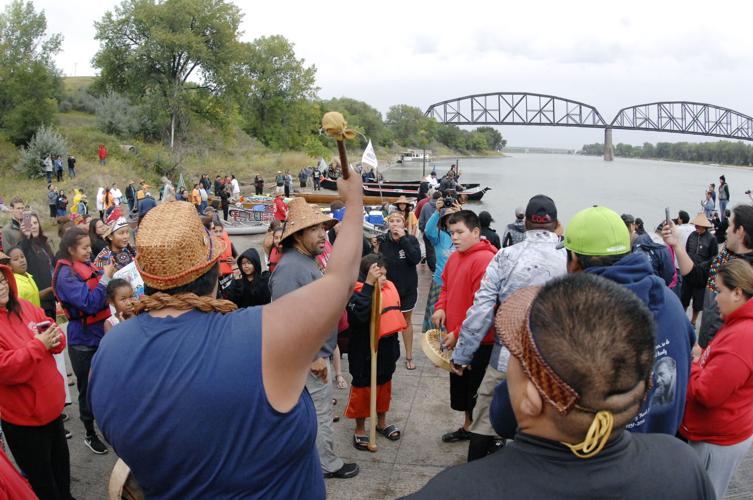Wensler Nosie of the San Carlos Apaches, Verlon Jose of the Tohono O’odham and Gabriel Ayala of the Pascua Yaquis are taking a stand against a $3.8 billion pipeline they’re worried will pollute a major Midwestern river.
They’re part of a much broader wave of Indian support in Arizona for the Standing Rock Sioux’s fight against the Dakota Access Pipeline.
Two weeks ago, Nosie, former San Carlos Apache tribal chairman, drove to North Dakota to support the Standing Rock — and told his story about the Apaches’ effort to stop a huge copper mine in their backyard.
Two nights ago, about 200 people led by Pascua Yaquis marched from Tucson’s southwest side to the Mission San Xavier to hold a prayer gathering for the pipeline fight, singing spiritual songs, banging drums and carrying signs saying “Water is life.”
On Sept. 18, groups of Tohono and Pascua Yaquis from Southern Arizona plan to caravan to North Dakota to bring the Standing Rock tribe food, medical supplies, batteries, equipment, chain saws, tents and rain jackets, along with “our social songs, our dances and our prayers,” said Verlon Jose, who is the O’odham vice chairman.
Two days later, internationally known Yaqui classical-jazz guitarist Gabriel Ayala, who played at a 2013 presidential inaugural ball in Washington, D.C., will make his own pilgrimage.
This outpouring is matching tribal support from around the United States. Tribes are sending people, food, prayers and equipment along with what they say will be their spiritual presence. Ayala said this week that the tribal presence at the pipeline site could become the largest gathering of Indians aimed at fighting a political battle since the 1973 takeover of Wounded Knee by the Oglala Sioux.
On Sunday, they’ll get help from U.S. Rep. Raúl Grijalva, a Tucson Democrat who says he’ll travel to North Dakota in support of the Sioux. Grijalva is the ranking Democrat on the House Natural Resources Committee.
What’s driving this pilgrimage?
First, “We have similar situations going on here in Arizona,” said the O’odham’s Jose.
The O’odham and Yaquis oppose the proposed Rosemont Mine, which they say would destroy many prehistoric cultural sites in the Santa Rita Mountains southeast of Tucson. The Gila River Indian Community is fighting construction of a freeway going past their reservation and cutting through South Mountain in Phoenix.
The San Carlos Apaches are fighting Resolution Copper’s efforts to build the United States’ largest copper mine on what’s now a federal campground at Oak Flat near the town of Superior. The Navajos are suing the Environmental Protection Agency over last year’s spill of toxic materials from the Gold King Mine into a tributary of the San Juan and Colorado rivers.
In some cases, Jose said, there was some consultation with the tribes, although not as much as they would prefer. But a lot of the work done by the Energy Transfer Partners on the Dakota pipeline was done without adequate consultation, Jose said.
For the Navajos, the mine didn’t spill pollutants directly on their reservation but the iron, arsenic and other poisons found their way downstream to that reservation, Jose said. The same risk holds for the Dakota pipeline, he said, which would be built on private land, less than a mile from tribal land, and could pollute the Missouri River if the line broke and spilled oil, he said. The Missouri serves the tribe and many other people.
Former San Carlos Apache Chairman Nosie said he spent two days at the construction area to meet with the Standing Rock leaders. They met less than a half mile from the scene of last Saturday’s confrontation, in which tribal members said they were sprayed with a chemical irritant and attacked by the pipeline company’s guard dogs, and where company officials said their workers were attacked by pipeline protesters.
“For native people, we feel this is a spiritual movement that is occurring about the water,” said Nosie, who has personally led the Apaches’ charge against the Resolution Copper underground mine.
“As we continue to pray, this kind of solidarity is coming together in this country,” he said in an interview from his San Carlos reservation home. “With young people reattaching themselves to their identity and to Mother Earth, which is their religion, we will see more people continuing to make their way there. We have to make this stand.
“Without water there is no life. You can’t eat copper. You can’t drink oil. This protest is going to continue because all we’ve got left to exist is this water,” he said.
For musician Ayala, the trip is his chance to be another voice in the debate.
“I’m in no way a famous role model, but I do have a following of people that follow me mainly because of my music,” Ayala said this week. “If I can use that platform to educate people and share what’s happening in our country, I think it’s important to do that.”
Ayala is holding a benefit concert on Sept. 16 near Saguaro National Park West to raise funds for the pipeline cause. When he arrives in North Dakota, “I’m going to go right to the source, right to the actual camp, outside Cannonball, North Dakota. I’m going to go by myself and take as many items as I can with me and stay as long as I can.
He found it “disheartening” to read of Standing Rock Sioux getting dog bites and protesters being pepper-sprayed.
“Children only learn of words like racism and hatred from us adults,” Ayala said. “You wouldn’t think this would happen today, but we who are indigenous people have been pushed down.”
He sees the North Dakota anti-pipeline gathering as an historic event.
“It’s not a protest. It’s a demonstration to show we care what’s happening to our Mother Earth here,” he said. “It was a great thing to see this native elder from South Dakota, and I don’t remember his name or his tribe, saying that the only pipes we have here are the pipes we use to pray.”


